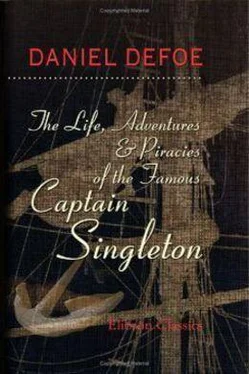We had enough of Ceylon, though some of our people were for going ashore again, sixty or seventy men together, to be revenged; but William persuaded them against it; and his reputation was so great among the men, as well as with us that were commanders, that he could influence them more than any of us.
They were mighty warm upon their revenge, and they would go on shore, and destroy five hundred of them. "Well," says William, "and suppose you do, what are you the better?" "Why, then," says one of them, speaking for the rest, "we shall have our satisfaction." "Well, and what will you be the better for that?" says William. They could then say nothing to that. "Then," says William, "if I mistake not, your business is money; now, I desire to know, if you conquer and kill two or three thousand of these poor creatures, they have no money, pray what will you get? They are poor naked wretches; what shall you gain by them? But then," says William, "perhaps, in doing this, you may chance to lose half–a–score of your own company, as it is very probable you may. Pray, what gain is in it? and what account can you give the captain for his lost men?" In short, William argued so effectually, that he convinced them that it was mere murder to do so; and that the men had a right to their own, and that they had no right to take them away; that it was destroying innocent men, who had acted no otherwise than as the laws of nature dictated; and that it would be as much murder to do so, as to meet a man on the highway, and kill him, for the mere sake of it, in cold blood, not regarding whether he had done any wrong to us or no.
These reasons prevailed with them at last, and they were content to go away, and leave them as they found them. In the first skirmish they killed between sixty and seventy men, and wounded a great many more; but they had nothing, and our people got nothing by it, but the loss of one man's life, and the wounding sixteen more, as above.
But another accident brought us to a necessity of further business with these people, and indeed we had like to have put an end to our lives and adventures all at once among them; for, about three days after our putting out to sea from the place where we had that skirmish, we were attacked by a violent storm of wind from the south, or rather a hurricane of wind from all the points southward, for it blew in a most desperate and furious manner from the S.E. to the S.W., one minute at one point, and then instantly turning about again to another point, but with the same violence; nor were we able to work the ship in that condition, so that the ship I was in split three top–sails, and at last brought the main–top–mast by the board; and, in a word, we were once or twice driven right ashore; and one time, had not the wind shifted the very moment it did, we had been dashed in a thousand pieces upon a great ledge of rocks which lay off about half–a–league from the shore; but, as I have said, the wind shifting very often, and at that time coming to the E.S.E., we stretched off, and got above a league more sea–room in half–an–hour. After that, it blew with some fury S.W. by S., then S.W. by W., and put us back again a great way to the eastward of the ledge of rocks, where we found a great opening between the rocks and the land, and endeavoured to come to an anchor there, but we found there was no ground fit to anchor in, and that we should lose our anchors, there being nothing but rocks. We stood through the opening, which held about four leagues. The storm continued, and now we found a dreadful foul shore, and knew not what course to take. We looked out very narrowly for some river or creek or bay, where we might run in, and come to an anchor, but found none a great while. At length we saw a great headland lie out far south into the sea, and that to such a length, that, in short, we saw plainly that, if the wind held where it was, we could not weather it, so we ran in as much under the lee of the point as we could, and came to an anchor in about twelve fathom water.
But the wind veering again in the night, and blowing exceedingly hard, our anchors came home, and the ship drove till the rudder struck against the ground; and had the ship gone half her length farther she had been lost, and every one of us with her. But our sheet–anchor held its own, and we heaved in some of the cable, to get clear of the ground we had struck upon. It was by this only cable that we rode it out all night; and towards morning we thought the wind abated a little; and it was well for us that it was so, for, in spite of what our sheet–anchor did for us, we found the ship fast aground in the morning, to our very great surprise and amazement.
When the tide was out, though the water here ebbed away, the ship lay almost dry upon a bank of hard sand, which never, I suppose, had any ship upon it before. The people of the country came down in great numbers to look at us and gaze, not knowing what we were, but gaping at us as at a great sight or wonder at which they were surprised, and knew not what to do.
I have reason to believe that upon the sight they immediately sent an account of a ship being there, and of the condition we were in, for the next day there appeared a great man; whether it was their king or no I know not, but he had abundance of men with him, and some with long javelins in their hands as long as half–pikes; and these came all down to the water's edge, and drew up in a very good order, just in our view. They stood near an hour without making any motion; and then there came near twenty of them, with a man before them carrying a white flag. They came forward into the water as high as their waists, the sea not going so high as before, for the wind was abated, and blew off the shore.
The man made a long oration to us, as we could see by his gestures; and we sometimes heard his voice, but knew not one word he said. William, who was always useful to us, I believe was here again the saving of all our lives. The case was this: The fellow, or what I might call him, when his speech was done, gave three great screams (for I know not what else to say they were), then lowered his white flag three times, and then made three motions to us with his arm to come to him.
I acknowledge that I was for manning out the boat and going to them, but William would by no means allow me. He told me we ought to trust nobody; that, if they were barbarians, and under their own government, we might be sure to be all murdered; and, if they were Christians, we should not fare much better, if they knew who we were; that it was the custom of the Malabars to betray all people that they could get into their hands, and that these were some of the same people; and that, if we had any regard to our own safety, we should not go to them by any means. I opposed him a great while, and told him I thought he used to be always right, but that now I thought he was not; that I was no more for running needless risks than he or any one else; but I thought all nations in the world, even the most savage people, when they held out a flag of peace, kept the offer of peace made by that signal very sacredly; and I gave him several examples of it in the history of my African travels, which I have here gone through in the beginning of this work, and that I could not think these people worse than some of them. And, besides, I told him our case seemed to be such that we must fall into somebody's hands or other, and that we had better fall into their hands by a friendly treaty than by a forced submission, nay, though they had indeed a treacherous design; and therefore I was for a parley with them.
"Well, friend," says William very gravely, "if thou wilt go I cannot help it; I shall only desire to take my last leave of thee at parting, for, depend upon it, thou wilt never see us again. Whether we in the ship may come off any better at last I cannot resolve thee; but this I will answer for, that we will not give up our lives idly, and in cool blood, as thou art going to do; we will at least preserve ourselves as long as we can, and die at last like men, not like fools, trepanned by the wiles of a few barbarians."
Читать дальше












